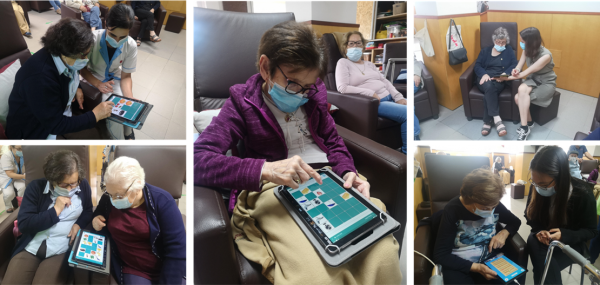Literacy for older people in the Cáritas Coimbra Centres
Cáritas Coimbra has the existence of an Innovation Department that has, in the last ten years, brought differentiated services and knowledge to the institution’s social responses, employees and users.
The digital literacy of older citizens has been a big bet of Cáritas Coimbra, and the results have been surprising. In many of the Day Centres, Residential Structures or even the Home Support Service, it is already possible to see users familiar with the new technologies and who handle them autonomously or with small help.
During the months of June and July, sessions on digital literacy have been held in the Cáritas Coimbra Centres frequented by older people. On June 6, it was the turn of the Centro Social S. Pedro, in Ingote, to receive a visit from the team of the Innovation Department, accompanied by a volunteer. This team has departed a session to promote active ageing using new technologies, in this case tablets. These sessions take place under the DAPAS project, which is an innovative solution based on the needs of older people and aims to improve their quality of life through communication tools, serious games, appointment slate and medication.
At the end of the home session, participants can freely use the tablets, with cognitive games being the preferred of most participants. These initiatives also arouse the curiosity of older adults who ask where they can see their favourite recipes, where they can read news and what applications they should use to talk to family members. Although, according to the Team department of Innovation, there was some initial resistance to the acceptance of new technologies, users say that they no longer want to “go back without a tablet” and that they liked to “use tablets even more easily”.
The goal will be to expand this initiative to all the structures of Cáritas Coimbra to support older people, with more sessions scheduled.
The DAPAS Project is co-financed by the European Active Assisted Living (ICT for Ageing, 2017) programme and, in this case Portuguese, by the Foundation for Science and Technology.
